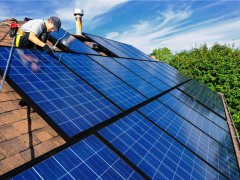据今日石油网2022年4月11日报道,联合国政府间气候变化专门委员会(IPCC)日前发布的最新报告称,为了拯救地球,使其免遭不可逆转的气候灾难,各国政府要么现在开始要么永远不开始减少排放。由于各国政府在全球范围内批准了多个石油和天然气项目,发达国家似乎选择了永远不开始减排。
IPCC主席李会晟说,“我们正处在十字路口。 我们现在所做的决定能够确保一个舒适的未来。 我们有限制气候变暖所需的工具和技术。”“我对许多国家正在采取的气候行动感到鼓舞。 事实证明,一些政策、法规和市场工具正在发挥作用。 如果这些措施得到推广,得到更广泛、更公平的应用,它们就能支持大幅减排,并促进创新。”
但据欧洲新闻报道,由于疫情的影响和地缘政治导致的能源危机,许多国家政府选择继续开发石油和天然气资源。
英国将在北海进行更多新油气钻井作业
作为新能源安全战略的一部分,英国政府最近宣布,北海新石油和天然气项目的许可证将在今年秋季开始出售。
环保人士和气候活动人士对英国政府此举表示愤怒,但英国政府为自己辩护,称这些项目对于实现能源自主是必要的,目的是摆脱对大国石油和天然气进口的依赖。
加拿大批准北部湾海上石油项目
加拿大政府日前正式批准了这个有争议的投资120亿美元(110亿欧元)的北部湾海上石油项目。
这个项目将由挪威能源巨头Equinor经营大约30年,在此期间,Equinor将在大西洋Flemish Pass运营一个浮式海上油气生产设施。 这个生产设施预计在为期30年的作业期间将钻取60多口新井。
加拿大政府表示,北部湾海上石油项目将帮助加拿大满足能源需求,度过艰难的转型时期。
这个项目的批准经过了数个月的辩论和为期4年的审查,但加拿大政府对北部湾进行了环境评估,得出结论称,“如果考虑到缓解措施”,这个项目不会对周边环境造成重大负面影响。
这些缓解措施包括Equinor在运营这个项目时必须满足的137项条件,包括保护野生动物、人类健康和当地资源获取。
英国:水力压裂技术仍在讨论中
英国商业、能源和产业战略部国务大臣克沃滕已下令就水力压裂技术发布一份简短报告,以调查其影响。他说,为了减少英国对进口能源的依赖,所有选项都应该摆在桌面上讨论。
英国地质调查局将调查与这种有争议技术有关的安全问题,从而结束自2019年以来对水力压裂作业的暂停,当时抗议活动迫使英国政府采取行动,阻止水力压裂技术在英国使用。
葡萄牙希望在莫桑比克建新天然气厂
埃克森美孚公司在莫桑比克牵头的天然气国际财团的合作伙伴葡萄牙化石燃料巨头Galp 能源公司不久前曾表示,该公司希望在2024年在这个非洲国家开建陆上天然气厂。
据路透社报道,Galp能源公司表达了对莫桑比克安全局势的担忧,在那里,武装分子一直活跃在这个价值500亿美元(450亿欧元)的液化天然气项目所在地的附近。
大国之间签署购买LNG新协议
这算不上一个新项目,但仍是全球化石燃料领域的一项新投资(即使是一个“更清洁”的项目):美国液化天然气开发商NextDecade公司日前签署了一项新协议,从2026年开始,民营公司每年将从这家美国公司购买150万吨液化天然气,为期20年。
这些液化天然气将来自位于得克萨斯州布朗斯维尔被提议的里约格朗德项目,据NextDecade公司称,这个项目将生产“世界上最绿色的液化天然气”。
液化天然气被认为是最清洁的化石燃料——它的温室气体排放量比煤炭少40%。
以色列德勒克集团扩大其在英国北海的存在
以色列德勒克集团旗下的伊萨卡能源公司最近宣布将收购西卡点能源公司,后者开发位于设得兰群岛附近有争议的坎博油田,这个项目在去年12月因壳牌公司退出而被搁置。
壳牌公司持有西卡点能源公司30%的股份,但退出了这个项目,称投资这个项目的经济理由“不够充分”。
以色列德勒克集团在2017年收购的在英国北海油气生产的伊萨卡能源公司将以13.9亿欧元(15亿美元)收购西卡点能源公司。
此次收购意味着坎博油田未来可能会被扩大产能,尽管环保人士对此表示愤怒,他们认为扩建将加剧气候危机。
李峻 编译自 今日石油网
原文如下:
Rich countries continue to approve new oil and gas projects despite climate concerns
The latest report from the Intergovernmental Panel on Climate Change (IPCC) released last week says it’s “now or never” for governments to start staving off emissions to save the planet from irreversible climate disaster. Rich countries seem to be choosing never, as governments approve multiple oil and projects across the globe.
“We are at a crossroads. The decisions we make now can secure a liveable future. We have the tools and know-how required to limit warming,” said IPCC Chair Hoesung Lee. “I am encouraged by climate action being taken in many countries. There are policies, regulations and market instruments that are proving effective. If these are scaled up and applied more widely and equitably, they can support deep emissions reductions and stimulate innovation.”
But in the face of an energy crisis due to fallout from the pandemic, many governments are opting to continue developing oil and gas resources, as a report from euronews.green points put.
UK: More drilling in the North Sea
As part of its new energy strategy, the UK government recently announced that licensing of new oil and gas projects in the North Sea will start this autumn.
Environmental campaigners and climate activists reacted with outrage to the move, but the UK government has defended itself saying such projects are necessary to achieve energy autonomy, with a view to getting rid of the uncomfortable dependence on oil and gas imports.
Canada approves Bay du Nord oil
Canada’s government has given the green light to the controversial $12 billion (11 billion) Bay du Nord offshore oil project.
The project will be managed by Equinor for about 30 years, during which the company will operate a floating offshore oil and gas production facility in the Flemish Pass, in the Atlantic Ocean. It is expected that more than 60 wells will be drilled during three decades of operations.
Canada’s government said that the project will help the country meet energy demands through a difficult time of transition.
The approval followed months of debates and a four-year-long review of the project, but the government, which conducted an environmental assessment of Bay du Nord, concluded that it will not cause significant negative effects to its surrounding environment “when mitigation measures are taken into account.”
These mitigation measures include 137 conditions Equinor will have to satisfy while operating the project, including protecting wildlife, human health and native access to resources.
UK: Fracking still on the table
British business minister Kwasi Kwarteng has ordered a short report on fracking to investigate its impact, saying that all options should be on the table to reduce Britain’s dependence on imported energy.
The British Geological Survey will investigate safety concerns related to the controversial practice, ending a moratorium on fracking which had been in place since 2019, when protests forced the UK government to take action to stop fracking in the country.
Portugal hopes to build new gas plants in Mozambique
Portugal’s Galp Energia, a partner of the Exxon-led gas consortium in Mozambique, just over a week ago that it hopes to start building onshore plants in the African country in 2024.
The company has expressed concerns over the security situation in Mozambique, where ISIS militants have been active near liquefied natural gas projects worth $50 billion (45 billion), Reuters reports.
A new deal between big country and the U.S.
Not quite a new project, but still a new investment in fossil fuels (even if a “cleaner” one): the big country’s ENN has signed a new deal with US-based NextDecade to buy 1.5 million tonnes per year of liquefied natural gas (LNG) for 20 years, starting in 2026.
The gas will come from the proposed Rio Grande project in Brownsville Texas which, according to NextDecade, will produce “the greenest LNG in the world.”
LNG is considered the cleanest of fossil fuels – it emits 40 per cent less emissions than coal.
Israel’s Delek Group expands its presence in UK’s North Sea
Ithaca Energy recently announced it will buy Siccar Point Energy, the company behind the controversial Cambo oil field off Shetland, a project which had been put on hold last December when Shell pulled out.
Shell had 30 per cent of stakes in the company but withdrew from the project saying the economic case for investing in the project wasn’t “strong enough.”
Ithaca Energy, the UK North Sea production arm of Israel’s Delek Group, which acquired it in 2017, is buying Siccar Point Energy for 1.39 billion ($1.5 billion).
The acquisition means that the Cambo oil field is likely to be expanded in the future, despite outrage from environmental campaigners, who believe the expansion of the development will worsen the climate crisis.
免责声明:本网转载自其它媒体的文章及图片,目的在于弘扬石化精神,传递更多石化信息,宣传国家石化产业政策,展示国家石化产业形象,参与国际石化产业舆论竞争,提高国际石化产业话语权,并不代表本网赞同其观点和对其真实性负责,在此我们谨向原作者和原媒体致以崇高敬意。如果您认为本站文章及图片侵犯了您的版权,请与我们联系,我们将第一时间删除。







